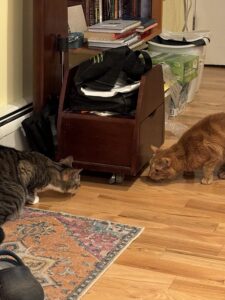Autumn is on the way! Soon it will be time to switch from my closet of 50 short-sleeved button-down shirts to my closet of 50 long-sleeved ones. This makes me not-so-nostalgic for a problem I had from the ages of 12 through 50: Boob Gap! I’m talking about that awkward pulling between the second and third buttons that anyone not built like a supermodel or a washboard has likely experienced. As part of “Boobs Week” at Slate Magazine, Shannon Palus wrote this feature on Aug. 15 about clothing companies that are trying to, well, fill that gap.
Left adrift by most (though not all) major clothing retailers, some women, like Allen, are taking matters into their own hands. A decade ago, as an adult, Allen started her own brand, Exclusively Kristen. Using herself as a fit model, she created a pattern for a button-up shirt that would neither pop open at the top nor leave extra fabric hanging around her midsection: a shirt that would just fit. The design achieves this with princess seams, which trace the body in a curve from the armpit, over the breast, and down to the hemline. This, Allen said, accentuates the figure, “without being inappropriate for work.”
…Even if you are a pro at shopping, finding clothes for an ample rack can be impossible. Alice Kim, another fashion entrepreneur, spent years employed as a buyer for major brands like Victoria’s Secret and Prada, working her way up to be a vice president of merchandising at Diane von Furstenberg. “And I still can’t find clothes that fit my body off the rack that I don’t have to tailor,” she said, recalling her frustration. In 2020 she founded PerfectDD, pronounced “perfected.” (Kim said that she is a 28I—but that she often refers to her own cup size as “DD” because “that’s what people understand.”) PerfectDD’s offerings, which include button-downs, scoop-neck tees, a lace corset top, and a jumpsuit, are designed for the titular DDs to M cups. The first time she tried on a sample of PerfectDD clothing, she “literally cried,” Kim said. Not having to size up into something baggy just so the clothes fit her breasts was a huge relief. “I was like, I look my size. This is the actual size of my body.”
If you’re not following Menswear Guy (@dieworkwear) on Twitter, you are missing some of the shadiest shade on the Internet, not to mention an entire education about men’s fashion history and the elements of a good fit. At Politico on Aug. 8, he explained why “Tim Walz’s Camo Cap Is More Important Than You Think”. Unlike a lot of politicians who dress down in an inept attempt to appear like Regular Joes, Walz comes by his “remarkably unremarkable look” naturally.
Walz’s avuncular outfits are visually successful because they are culturally coherent — teaming workwear with workwear, rather than mixing suit jackets with jeans, as DeSantis was wont to do. They also rely on classics from American heritage labels, such as LL Bean’s barn coat, Carhartt’s utility pants, Filson’s Mackinaw and Red Wing’s work boots. But most of all, they possess a quality that style writers have spent generations trying to dissect: authenticity. Walz grew up in small town Nebraska, where his high school graduating class included about 25 students. He earned his bachelor’s degree from a small public state college before going on to serve in the Army National Guard and then working at Mankato West High School, where he taught geography and coached football. His hunting get-ups don’t look contrived because he’s an actual hunter.
This critical dash of authenticity is why Arizona Sen. Mark Kelly, who served in the military, looks natural in his bomber jackets; why former President George W. Bush could convincingly pull off cowboy boots; and why New England-raised John Kerry and Mitt Romney look at home in preppy barn coats.
It’s also why former President Donald Trump stands as a unique figure in today’s dressed-down environment. Except for when he’s on the golf course, Trump is rarely, if ever, seen in anything but a navy worsted suit, white spread collar shirt and crimson, satin tie. The uniform burnishes Trump’s reputation as a successful businessman.
Walz is doing the same, but for the opposite effect.
I got a kick out of this flash fiction by Karen Heuler in Electric Literature, “So Much to Know”. The narrator’s deadpan observational humor creates a perception of her as a dotty older lady, which works to her advantage when confronting a mugger.
I’ve learned that new experiences keep the aging brain on task. I don’t worry about myself as long as I stay interested in life. Actually, I think I worry less than most people do, and that’s reassuring.
I was robbed one night, at knifepoint, and the knife interested me. I asked about it.
“Forget the knife. Don’t ask about the knife. Or I’ll use it,” my assailant said. He was getting nervous.
“But isn’t it a kitchen knife? Can you really just grab a kitchen knife and run out the door like that? Won’t it cut you just as likely as it cuts me, for instance? You should have a holder.” That was obvious, and the obvious deserves recognition.
“Give me your money,” he said.
“Of course,” I said. “I certainly will. I have a twenty-dollar bill in my pocket, but I’m afraid that’s it. I was just going to the drugstore to get some soda. Funny isn’t it, that we go to drugstores now instead of delis? I grew up when there were delis.”
Daniel Lavery mashes together two of my special interests in this 2020 article from his Substack archives, “Which Misconception About Testosterone Therapy Does Each Character from the Popular TV Show ‘The Sopranos’ Subscribe To?”
PAULIE: T, all due respect — all due respect — the Bada Bing is a women’s space, and I think you at least gotta take that into consideration before you make a decision.
TONY: You saying I can’t come into the Bing? I created the Bing.
SILVIO: No one’s saying anything, Ton. You go wherever you feel led to go.
PAULIE: You just gotta be mindful, T.
At LitHub, Gabrielle Bellot’s essay “The Joys and Fears of Trans Motherhood” reflects with humor and poignancy on her own mother as a model for the devotion she will show to her future child, and their subsequent estrangement when she transitioned. Some of the obstacles faced by Bellot and her partner are familiar to couples coping with the uncertainty and cost of IVF, and some are unique to queer folks surrounded by right-wing propaganda that we’re a threat to “The Family”.
When we first became serious about trying, my wife and I decided to go through sperm banks. I hadn’t imagined just how much like online dating sperm bank sites could be. I also never imagined I would say the word sperm more than a certain chapter of Moby Dick.
I didn’t realize how unprepared I was until our first try, when we received the sample in a heavy luggage-like shipping container that had the distinct appearance of biohazardous cargo. When we opened it, we found another container inside, this one arctic from dry ice; frigid air unfurled when we unlocked it. We then had to thaw the sperm and, nurse-like, prep a long syringe to transfer the sample into, which ended up being the trickiest part.
Everything, we quickly learnt, had to be clinically precise: when you order the sample relative to when you assume you’ll be ovulating, when you open the inner container, how long you let the sample thaw, how you transfer the semen to the insertion tube, how you lie on your back and for how long after the insertion, how you repackage the imposing shipping container to be returned.
We tried a few times, and although we thought we got everything right—minus the unfortunate time that I dropped most of the sperm on the kitchen floor—it felt like stumbling in the dark, hoping for the best. We switched to IUI, which involved a doctor performing the whole, slightly more in-depth ritual, but even then, we had to deal with mishaps and ignorance, including a doctor seemingly shunning the advice not to thaw the sperm in water, while another seemed cavalier about missing an ovulation window or differed sharply about how to position your body after insemination.
The whole process soon started to feel horribly biased against queer couples, in part because the language in almost every fertility guide we read was explicitly tailored to straight couples who could keep trying even without the donor material. For us, though, each expensive effort was the only shot we had, so it mattered to get it, well, right. And while the odds for IUI are never sky-high, it’s hard not to blame yourself (and differing doctors) each time it fails. The pregnancy test has become a sort of scrying pool, a future-reflecting thing you approach as much with dread as hope.
Speaking of parent-child relations, novelist Jessica Pegis (The God Painter) sent me this provocative essay from the Greek Orthodox Archdiocese of America/Metropolis of San Francisco website, after she read the queer midrash on the Binding of Isaac in my novel Origin Story. Rev. Fr. Seraphim Ivey, the writer of “Blessed Abraham: The Troubling Narrative of Abraham, Isaac, the Sacrifice, and the Missing Bits Between”, observes that there are problems with reading this Genesis 22 story as a prefiguration of the Crucifixion:
First, Abraham is known for seeking counsel and talking about his plans with those closest to him – Sarah, Lot, the Lord, etc. For him to not enter into discussion about anything God has asked him to do, even in passing with his wife or the Lord Himself in depth, is challenging to say the least. This is especially so in light of how much Abraham loves them both. Didn’t Abraham dialogue with the Lord over Sodom and Gomorrah and about Lot’s fate? Why would he not have done so over Isaac’s even more so? What about Sarah? Isn’t Isaac Sarah’s son as well? Where is the love being expressed between the two of them?
Second, if Isaac is the prefigurement of Christ, then shouldn’t there have been dialogue between the father and the son about the impending sacrifice? If the sacrifice is to be the proper and right kind of sacrifice, then it must be voluntarily given. This is not an animal being offered up, but a human being. So it can’t just be Abraham offering to sacrifice his son. Isaac too must be given the opportunity to voluntarily lay his life down. For this to happen there must be some informed dialogue. This is seemingly absent from the text. Even the ending is challenging. Rather than the son returning home with the father, the father comes home alone.
I was impressed to see this priest bringing up the issue of consent, which is so often sidelined in Bible stories as compared to its centrality in modern psychology and ethics. Fr. Ivey hints that perhaps not everything in the Bible should be read straightforwardly as a go-and-do-likewise: “We might also look to extra-biblical texts, including Jewish sources, for commentary on these texts, trusting God will help us discern which are from Him and which are not.”
Sources, perhaps, like the book reviewed in this 2012 article from The Times of Israel, “When Abraham Murdered Isaac”. Biblical scholar Tzemah Yoreh believes that the happy ending of the ram in the thicket was tacked on later, to an original narrative where Abraham did in fact sacrifice his son.
One eye-opening hint at what he believes is the original story lies in Genesis 22:22. Previously, in verse 8, Abraham and Isaac had walked up the mountain together. But in verse 22, only Abraham returns.
…That strange contradiction, Yoreh says, may be why a few ancient midrashim, or rabbinic homilies, also assumed Isaac had been killed.
In one homily quoted by Rashi, the revered 11th-century French rabbi and commentator, “Isaac’s ashes are said to be suitable for repentance, just like the ashes of an [animal] sacrifice.”
Yoreh also relies on the widely accepted hypothesis that the Torah consists of several narratives from different time periods braided together, identifiable by the different names they use for God, e.g. YHWH or Elohim.
The Biblical text calls the God who instructs Abraham to sacrifice his son “Elohim.” Only when the “angel of God” leaps to Isaac’s rescue does God’s name suddenly change to the four-letter YHWH, a name Jews traditionally do not speak out loud.
Elohim commands the sacrifice; YHWH stops it. But it is once again Elohim who approves of Abraham for having “not withheld your son from me.”
…Indeed, Isaac is never again mentioned in an Elohim storyline. In fact, if you only read the parts of Isaac’s life that use the name Elohim, you don’t have to be a Bible scholar to see the story as one in which Isaac is killed in the sacrifice and disappears completely from the Biblical story.
You won’t find that on a flannelboard in Sunday School, kids. (At least I hope not!)





